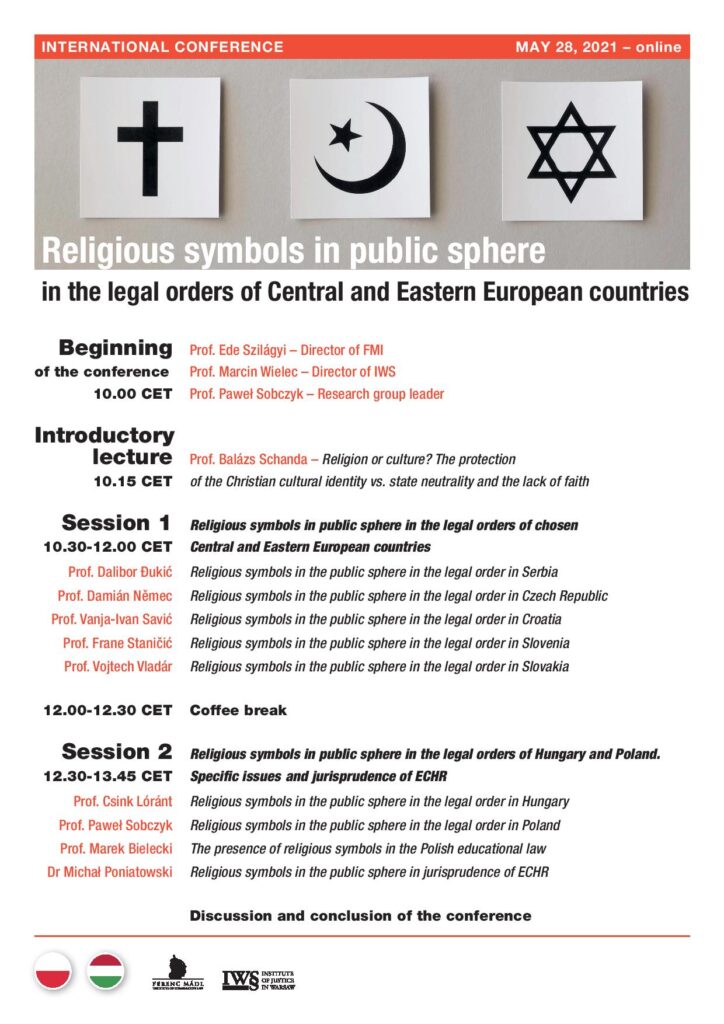On 28 May 2021, the International Scientific Conference entitled “Religious symbols in the public sphere in the legal orders of Central and Eastern European countries” took place in Warsaw, which was organised within the Central European Professors’ Network 2021 by the Institute of Justice in Warsaw, in cooperation with the Ferenc Mádl Institute of Comparative Law and the European Association for Comparative Law.
The conference was one of the events of the Research Group “Freedom of Conscience and Religion in Europe”.
Due to the state of the pandemic, the conference was organised online on the Zoom platform, as part of the tasks of the research group of Prof. Paweł Sobczyk and Dr. Michał Poniatowski.
The concept of the conference: The discussion about the presence of religious symbols has been going on in European realities for several decades. It is often marked by enormous emotional intensity, reflecting the attitude of society to the basic values on which European culture and civilization are based, and it also testifies to the Christian identity of nations.
The main assumption of the analysis is to show the normative aspect in the selected European countries relating to the possibility of manifesting one’s beliefs through religious symbols. The position of the judiciary, expressed both by international bodies and by the national judicial system, plays a fundamental role in shaping the contemporary model. It should also be emphasized that historical conditions also have an impact on the presence of religious symbols in public space. The conducted research will show the right of believers to manifest their religious feelings in public space while respecting the separateness and tolerance of people with different views.
The scientific part of the conference began with a lecture by a special guest Prof. Balázs Schanda: “Religion or culture? The protection of the Christian cultural identity vs. state neutrality and the lack of faith”.
After the introductory lecture, in the first conference session, “Religious symbols in the public sphere in the legal orders of chosen Central and Eastern European countries” the lectures were delivered by:
- Dalibor Đukić – “Religious symbols in the public sphere in the legal order in Serbia”,
- Damián Němec – “Religious symbols in the public sphere in the legal order in the Czech Republic”,
- Vanja-Ivan Savić – “Religious symbols in the public sphere in the legal order in Croatia”,
- Frane Staničić – “Religious symbols in the public sphere in the legal order in Slovenia”,
- Vojtech Vladár – “Religious symbols in the public sphere in the legal order in Slovakia”.
Following this, in the second session: “Religious symbols in the public sphere in the legal orders of Hungary and Poland. Specific issues and jurisprudence of ECHR”, Prof. Marek Bielecki, the second special guest of the international conference, delivered a presentation titled: “The presence of religious symbols in the Polish educational law”.
The following papers in this session were given by:
- Lóránt Csink – “Religious symbols in the public sphere in the legal order in Hungary”,
- Paweł Sobczyk – “Religious symbols in the public sphere in the legal order in Poland”,
- Dr Michał Poniatowski – “Religious symbols in the public sphere in jurisprudence of ECHR”.
The conference was followed by a brief discussion on the religious symbols in the logos of international organizations such as the Red Cross and the Red Crescent.
Prof. János Ede Szilágyi, Head of the Ferenc Mádl Institute of Comparative Law, summarized and concluded the conference. He drew attention to the importance of the issues raised, the international significance of the presence of religious symbols in public space, and the common values that sometimes underlie various contemporary legal solutions.


